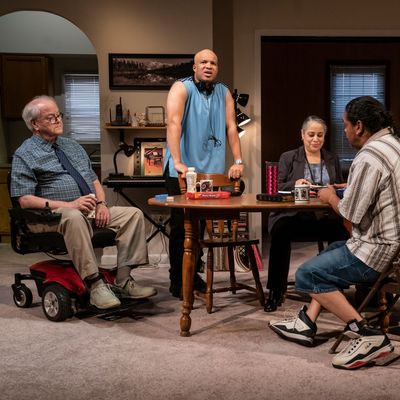
Downstate wants to make you sit in discomfort as long as possible and see what lies on the other side. Bruce Norris’s play takes for its subject the lives of sex offenders. It holds its audience in both the reality of what they have committed and the lives they now live in a shabby group home in downstate Illinois with crumbling furniture, a broken window, and a generic inspirational poster encouraging “perseverance.” The very premise aims to spark a reaction, but the production is most effective at the level of a simmer: Imagine these men’s lives, what they talk about, where the law tells them they can and can’t go to get groceries. Dip your toe into empathy, but careful: The water’s boiling.
The play begins with a confrontation, though it’s a carefully mediated one. Andy (Tim Hopper), a 40-something urban professional, has come down from Chicago with his wife, Em (Sally Murphy), to read a statement to Fred (Francis Guinan), who at first appears to be a kindly old man in a wheelchair — the script notes that he should act “not unlike Fred Rogers.” But there’s menace in the way he keeps interrupting Andy and in the way that Andy starts to get aggressive toward Fred when his wife isn’t paying attention. Fred, we soon learn, was Andy’s childhood piano teacher and abuser. He admitted to that in court and was jailed and eventually sent to this group home, though he did not admit to all the details that Andy remembers. Andy, at his wife’s encouragement, wants to get Fred to sign a reconciliation contract in order to heal, but in his heart he wants something punitive. He keeps reminding Fred that he is “fundamentally evil.” At one point, Norris has Fred respond to one instance of being called evil with a bleak as hell but funny “you did say that.”
That first clash is inconclusive, but you know another one has to come by the end of the play, especially because Andy maybe-not-so-accidentally leaves behind his iPhone. (It’s the Chekhov’s gun of the situation, as the men downstate feel as far from Chicago as the three sisters from Moscow.) Norris goes to great care in imagining the minutiae of the lives of all the men who live in the home and the net of overlapping needs and resentments that links them. Fred has a confidant and protector of a sort in Dee (K. Todd Freeman), who also lives off Fred’s disability benefits. A younger man, Gio (Glenn Davis), imagines himself as better than the others because he’s only a level-one offender for statutory rape, quotes the Bible often, and is hustling to build a career. Felix (Eddie Torres) mostly keeps to his room, until their probation officer, Ivy (Susanna Guzmán), arrives and tries to draw out a confession of how he may have violated the rules by using a library computer.
Downstate comes to New York after acclaimed runs in Chicago at Steppenwolf and at the National Theatre, and the experience shows in its disarming, talky smoothness. Pam MacKinnon, directing, keeps almost all the conversations running with uptempo precision, adding small details that unsettle you along the way — there’s a package of Nutter Butters that takes on the significance of a cursed idol. Hopper, Guinan, Freeman, Davis, and Torres are back from previous productions, and are at all at ease in the way they can angle their characters one way to make you feel sympathy and another toward revulsion and dread. Guzmán, meanwhile, brings an unmerciful directness to Ivy, a sense that the only way she can do this job is to be friendly and ruthless. As Dee, who’s very fond of his DVD collection of classic movies, Freeman gives an exceptional performance that’s both pathetic and venomous — like a caged snake. The play’s best exchanges are between Dee and Andy, where his righteous anger comes up against Dee’s claims that he and Fred have been punished enough. Dee’s a persuasive character, and you may be tempted to believe him. But then do you believe he and a 14-year-old were in love?
Eventually, the intimations of violence that Norris sprinkles into the text scale into an actual blowup, though the eventual outburst is a little neat and less compelling than the unnerving buildup has been. Norris has Andy and especially Em parrot a lot of the language of contemporary victimization in a way that can make them seem a little like liberal caricatures (she even teaches yoga). There, he gets pedantic about the potential excesses of campaigns against predators and the idealization of victims. Since 2018, we’ve seen the limits of the reckoning inspired by movements like Me Too, as well as the increased weaponization on the right of the threat of child abuse, and Norris’s critique simplifies things to respond to a conversation that’s already played out. He’s putting his finger on the scale to make Andy less palatable and to prod the perhaps similar-minded audience in the ribs. You can see the playwright’s game.
Downstate is better when it’s not trying to be of the moment. Norris weaves a lot into the texture of the men’s day-to-day lives that it’s the mundanity that ends up sticking with you. He raises all the logistical matters of what you end up watching if you can’t access the internet, or buying if you can’t go near a school, or doing to earn money if most people won’t hire you. Gio keeps quoting the Bible, almost as a character tic — as if forgiveness is another hustle he’s bought into — but it keeps the New Testament in the back of your mind as you watch. What sort of not quite justice, not quite redemption, not quite life is owed to the residents of a halfway house?
Downstate is at Playwrights Horizons through January 7.


